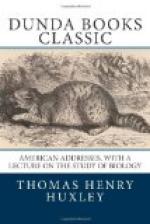I might go on multiplying these examples, but I see that the clock won’t wait for me, and I must therefore pass to the third question to which I referred: Granted that Biology is something worth studying, what is the best way of studying it? Here I must point out that, since Biology is a physical science, the method of studying it must needs be analogous to that which is followed in the other physical sciences. It has now long been recognised that, if a man wishes to be a chemist, it is not only necessary that he should read chemical books and attend chemical lectures, but that he should actually perform the fundamental experiments in the laboratory for himself, and thus learn exactly what the words which he finds in his books and hears from his teachers, mean. If he does not do so, he may read till the crack of doom, but he will never know much about chemistry. That is what every chemist will tell you, and the physicist will do the same for his branch of science. The great changes and improvements in physical and chemical scientific education, which have taken place of late, have all resulted from the combination of practical teaching with the reading of books and with the hearing of lectures. The same thing is true in Biology. Nobody will ever know anything about Biology except in a dilettante “paper-philosopher” way, who contents himself with reading books on botany, zoology, and the like; and the reason of this is simple and easy to understand. It is that all language is merely symbolical of the things of which it treats; the more complicated the things, the more bare is the symbol, and the more its verbal definition requires to be supplemented by the information derived directly from the handling, and the seeing, and the touching of the thing symbolised:—that is really what is at the bottom of the whole matter. It is plain common sense, as all truth, in the long run, is only common sense clarified. If you want a man to be a tea merchant, you don’t tell him to read books about China or about tea, but you put him into a tea-merchant’s office where he has the handling, the smelling, and the tasting of tea. Without the sort of knowledge which can be gained only in this practical way, his exploits as a tea merchant will soon come to a bankrupt termination. The “paper-philosophers” are under the delusion that physical science can be mastered as literary accomplishments are acquired, but unfortunately it is not so. You may read any quantity of books, and you may be almost as ignorant as you were at starting, if you don’t have, at the back of your minds, the change for words in definite images which can only be acquired through the operation of your observing faculties on the phenomena of nature.
It may be said:—“That is all very well, but you told us just now that there are probably something like a quarter of a million different kinds of living and extinct animals and plants, and a human life could not suffice for the examination of one-fiftieth part of all these.” That is true, but then comes the great convenience of the way things are arranged; which is, that although there are these immense numbers of different kinds of living things in existence, yet they are built up, after all, upon marvellously few plans.




